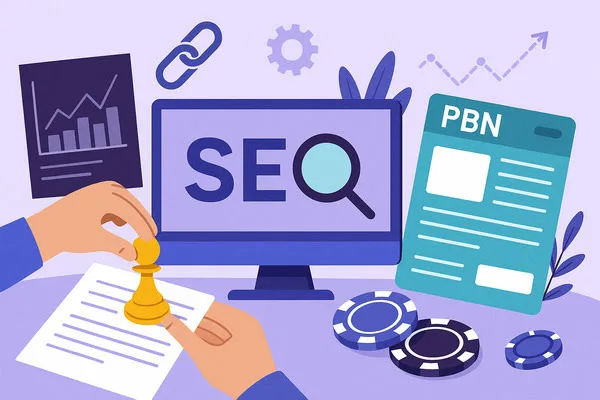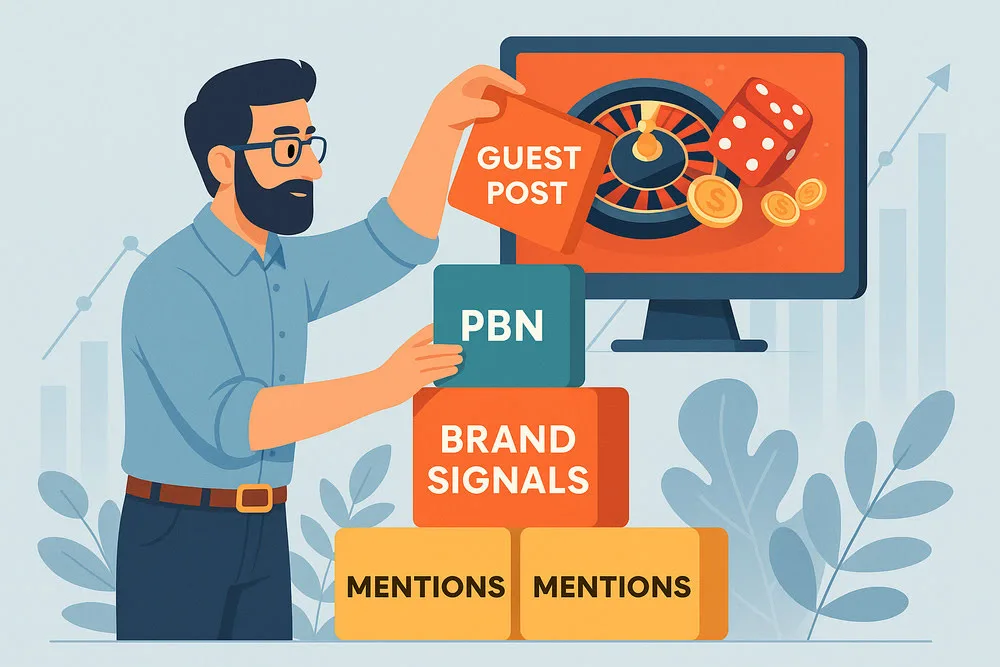
Guest Posts and PBNs in iGaming: Do They Still Work in 2025?
In the competitive SEO landscape of iGaming, link-building remains one of the core strategies for improving organic visibility. Among the most debated approaches are guest posting and PBNs (Private Blog Networks). To make informed decisions in 2025, it’s essential to understand what each of these methods entails and how they differ in application and risk level.
Guest Posts and PBNs in iGaming: Fundamentals and Differences
Before deciding whether to use guest posts or PBNs in your iGaming SEO strategy, it’s important to understand what these methods represent and how they function.
What Are Guest Posts and Why Are They Used
Guest posting is a practice where content is published on third-party websites with backlinks to the target site. This method has long been used in iGaming SEO to build authority, drive referral traffic, and diversify backlink profiles. For gambling-related projects, especially those in regulated markets, guest posts also offer a way to place contextually relevant links in editorial environments.
While outreach-based guest posting may involve negotiating placements or paying for publishing rights, it can lead to quality backlinks from niche-relevant domains. The effectiveness of this method, however, now depends heavily on the reputation of the host site and the quality of the content.
How PBNs Work and Why They’re Still Used
PBNs, or Private Blog Networks, are networks of expired or purpose-built domains controlled by one entity, used to link back to a money site. In iGaming, where acquiring quality backlinks can be expensive or restricted by publisher policies, PBNs offer a shortcut to building links in bulk and with full control.
Unlike guest posting, which involves third-party negotiation and editorial approval, PBN links can be deployed at scale. However, this control comes at a cost: if identified, PBN links are considered manipulative by Google and can trigger manual penalties or algorithmic devaluation. That said, some operators still rely on them, especially when cloaked behind legitimate-looking content and diverse hosting infrastructure.
What Changed in SEO for iGaming in 2025
Search engine optimisation in the iGaming sector has undergone major shifts in 2025. Google’s algorithm updates have continued targeting low-quality link schemes, over-optimised anchor text, and artificial content manipulation. This evolution has significantly impacted how SEO professionals approach guest posting and PBN strategies, especially in highly competitive niches like online casinos.
Relevance of These Methods Under New Algorithmic Standards
The introduction of stricter link spam detection and a deeper emphasis on E-E-A-T (Experience, Expertise, Authoritativeness, and Trustworthiness) has made outdated link strategies increasingly risky. Many gambling operators have seen volatility in their rankings when relying too heavily on low-quality PBNs or mass-published guest content lacking editorial value.
For instance, the well-known online casino brand Queen Casino experienced a temporary drop in organic visibility following the March 2025 Core Update. The site had previously benefited from aggressive guest post outreach and several affiliate-driven PBN links. However, after cleaning up its backlink profile and shifting focus to authoritative mentions in gaming publications, the casino recovered its rankings within two months. This case highlights how alignment with Google’s evolving expectations is now critical to long-term success.

Do These Methods Still Work in 2025?
With Google’s evolving standards and increased scrutiny on link-building techniques, the question isn’t just whether guest posts or PBNs work, but under what conditions they can still deliver value in iGaming SEO. As competition intensifies, results hinge more on quality, relevance, and risk mitigation than on volume alone.
Effectiveness and Risks
Guest posts continue to work in 2025 — but only when placed on high-quality, topic-relevant websites that offer genuine editorial oversight. In iGaming, this means collaborating with niche blogs, casino review platforms, or industry publications that are indexed, trusted, and maintain real user engagement. When used thoughtfully, guest posting supports long-term growth and brand visibility.
PBNs, on the other hand, remain controversial. While they can provide fast backlink acquisition, they also carry high risk. Google’s Link Spam Update now more effectively detects patterns in hosting, footprints, and content duplication. Sites using poorly managed PBNs often face ranking drops or manual actions — especially in sensitive sectors like gambling. Even cloaked or geographically distributed networks are no longer as safe as they once were.
That said, some SEO agencies and affiliates still use “private PBNs” with strict operational discipline: unique designs, original content, separate IPs, and manual link placement. In such cases, PBNs may deliver short-term results, but they require constant maintenance and pose a long-term trust risk with Google. In iGaming — a YMYL (Your Money or Your Life) niche — sustainability often outweighs shortcuts.
What to Choose and How to Proceed
Given the current SEO landscape in 2025, gambling operators and affiliates must weigh the benefits of short-term tactics against long-term trust. While both guest posting and PBNs can still influence rankings, the context in which they’re used — and the way they’re executed — makes all the difference.
Alternative: Organic Link-Building and Digital PR
For those looking to build durable SEO value in iGaming, alternative strategies have gained traction. Digital PR campaigns, organic mentions in authoritative media, and collaborations with trusted affiliates or influencers now deliver safer and more impactful link profiles. These approaches not only align with Google’s policies but also enhance brand credibility among real users.
Instead of relying on a network of self-owned blogs or paying for placements on thin sites, investing in quality content, authentic partnerships, and earned media has become the smarter path. In a sector as competitive — and scrutinised — as online gambling, building trust is no longer optional. It’s the foundation for ranking stability and sustainable traffic in 2025 and beyond.
